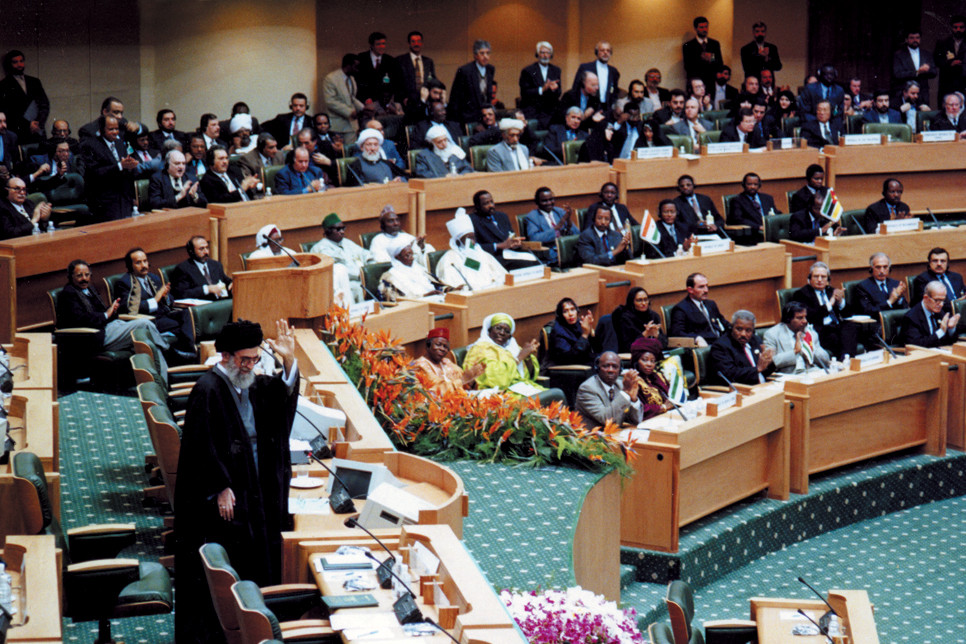4.3.6 The Cairo Declaration and Human Rights

Life is a God-given gift and the right to life is guaranteed to every human being. It is the duty of individuals, societies and states to safeguard this right against any violation, and it is prohibited to take away life except for a shari’ah prescribed reason (Cairo Declaration on Human Rights, 1990).
While most states did approve the Universal Declaration of Human Rights (UDHR), Saudi Arabia expressed concerns about the provision allowing individuals to change their religion, among other things, and did not sign. Iran later asserted that the UDHR was secular and culturally specific to the West and therefore not universal. Arguing that Islam prescribed a unique approach to human rights, the Organization of Islamic Cooperation gathered in Tehran in 1989 to draft an “Islamic” international human rights document.
This learning material will familiarize students with the Cairo Declaration on Human Rights in Islam as well as the concerns expressed by the human rights community about the limits to the rights protected in the document—above all its state-centric nature. In the first response essay, Professor of International Relations Turan Kayaoglu, at the University of Washington, Tacoma, details concerns for the research center Brookings Institute Doha. In the second response, Ann Elizabeth Mayer, Professor of Legal Studies at the University of Pennsylvania, identifies areas of legal distance between the Cairo Declaration and other international human rights law, while dismantling the illusion of a single, monolithic Islamic approach to human rights.
Read: Cairo Declaration on Human Rights in Islam // United Nations
Guiding Questions:
- Focus on Article 2. What differences do you note between the UDHR and the Cairo Declaration? Are there limitations to the rights laid out in each? What entity gets to determine, according to each document, whether rights are applied or denied?
- Review Article 11. Why do you think colonialism was specifically mentioned as an evil in this declaration of rights?
- Look up mentions of the word “religion.” Are the rights of individuals of other religions protected? Is having equal dignity the same as having equal rights?
Read: It’s Time to Revise The Cairo Declaration of Human Rights in Islam // Brookings
Guiding Questions:
- What are the four concerns the author lists with the Cairo Declaration’s “claim of adherence to Shari’ah”?
- Why does the author state that the Cairo Declaration protects fewer rights than the UDHR?
- What do you think is one way that Islam could “be invoked to protect more rights than those provided by similar human rights instruments, not fewer”?
Read: Universal Versus Islamic Human Rights: A Clash of Cultures or a Clash with a Construct? // Michigan Journal of International Law
“No reasons were offered adequately explaining why granting the government of a modern nation State, an institution borrowed from the West and unknown in Islamic tradition, such great latitude in defining the grounds for denying and restricting rights should be deemed appropriate in a system based on Islam” (Mayer, 325).
Read from pages 364-371, “Deconstructing the Constructs: Dissident Muslim Voices” and 402-404, “Conclusion.”
Guiding Questions:
- What groups contest authority to define “Islamic human rights” in the Dissident Muslim Voices section?
- Mayer argues that presenting “Islamic human rights” as irreconcilable to “international human rights” benefits anti-Islam actors as well as Muslim governments and groups seeking to improve their legitimacy with domestic and international audiences and deny certain rights to their citizens. Do you agree?
- How are references to human rights, whether explicitly Islamic or not, used in your context? Do they help to expand people’s freedom and well-being?
Thumbnail: Eighth summit of the Organization of Islamic Cooperation, 1997. Photo Credit: Khamenei.ir, on Wikimedia Commons. CC BY 4.0 International.


